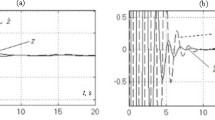Abstract
In this paper, a cognitive stabilizer concept is introduced. The framework acts as an adaptive discrete control approach. The aim of the cognitive stabilizer is to stabilize a specific class of unknown nonlinear MIMO systems. The cognitive stabilizer is able to gain useful local knowledge of the system assumed as unknown. The approach is able to define autonomously suitable control inputs to stabilize the system. The system class to be considered is described by the following assumptions: unknown input/output behavior, fully controllable, stable zero dynamics, and measured state vector. The cognitive stabilizer is realized by its four main modules: (1) “perception and interpretation” using system identifier for the system local dynamic online identification and multi-step-ahead prediction; (2) “expert knowledge” relating to the quadratic stability criterion to guarantee the stability of the considered motion of the controlled system; (3) “planning” to generate a suitable control input sequence according to a certain cost function; (4) “execution” to generate the optimal control input in a corresponding feedback form. Each module can be realized using different methods. Two realizations will be stated in this paper. Using the cognitive stabilizer, the control goal can be achieved efficiently without an individual control design process for different kinds of unknown systems. Numerical examples (e.g., a chaotic nonlinear MIMO system–Lorenz system) demonstrate the successful application of the proposed methods.











Similar content being viewed by others
References
Ahle, E., Söffker, D.: Interaction of intelligent and autonomous systems part-ii realization of cognitive technical systems. Math. Comput. Model. Dyn. Syst. 14(1), 319–339 (2008)
Barmish, B.: Necessary and sufficient conditions for quadratic stability of an uncertain system. J. Optim. Theory Appl. 46(4), 399–408 (1985)
Bukkems, B., Kostic, D., de Jager, B., Steinbuch, M.: Learning-based identification and iterative learning control of direct-drive robots. IEEE Trans. Control Syst. Technol. 13, 537–549 (2005)
Cacciabue, P.: Modelling and Simulation of Human Behaviour in System Control. Springer, London (1998)
Campi, M., Savaresi, S.: Direct nonlinear control design: the virtual reference feedback tuning approach. IEEE Trans. Autom. Control 51, 14–27 (2006)
Gill, P., Murray, W., Wright, M.: Practical Optimization. Academic press, London (1981)
Girard, A., Rasmussenand, C., Murray-Smith, R.: Multiple-step ahead prediction for nonlinear dynamic systems—a gaussian process treatment with propagation of the uncertainty. Adv. Neural Inf. Process. Syst. 15, 529–536 (2003)
Haykin, S.: Neural Networks. Prentice Hall international, New Jersey (1999)
Hjalmarsson, H., Gevers, M., Gunnarsson, S., Lequin, O.: Iterative feedback tuning: theory and applications. IEEE Control Syst. 18(4), 26–41 (1998)
Hou, Z., Jin, S.: Data-driven model-free adaptive control for a class of mimo nonlinear discrete-time systems. IEEE Trans. Neural Netw. 22, 2173–2188 (2011)
Jiang, Y., Jiang, Z.: Robust adaptive dynamic programming and feedback stabilization of nonlinear systems. IEEE Trans. Neural Netw. Learn. Syst. 25, 882–893 (2014)
Kocijan, J., Girard, A., Banko, B., Murray-Smith, R.: Dynamic systems identification with gaussian processes. Math. Comput. Model. Dyn. Syst. 11(4), 411–424 (2005)
Kwok, C., Fox, D., Meila, M.: Real-time particle filters. Proc. IEEE 92, 469–484 (2004)
Liu, D., Wang, D., Zhao, D.: Adaptive dynamic programming for optimal control of unknown nonlinear discrete-time systems. In: 2011 IEEE Symposium on Adaptive Dynamic Programming and Reinforcement Learning, pp. 242–249 (2011)
Meiser, S.: Points location in arrangements of hyperplanes. Inf. Comput. 106, 286–303 (1993)
Murray, J., Cox, C., Lendaris, G., Saeks, R.: Adaptive dynamic programming. IEEE Trans. Syst. Man Cybern. Part C Appl. Rev. 32, 140–153 (2002)
Niu, B., Zhao, J.: Barrier Lyapunov functions for the output tracking control of constrained nonlinear switched systems. Syst. Control Lett. 62(10), 963–971 (2013)
Nowak, X., Söffker, D.: A new model-free stability-based cognitive control method. In: Proceedings of the ASME 2014 Dynamic Systems and Control (DSC) conference, vol. 3, p. V003T47A002 (2014)
Precup, R., Rădac, M., Tomescu, M., Petriu, E., Preitl, S.: Stable and convergent iterative feedback tuning of fuzzy controllers for discrete-time siso systems. Expert Syst. Appl. 40(1), 188–199 (2013)
Rasmussen, C., Williams, C.: Gaussian Processes for Machine Learning. The MIT Press, Cambridge (2006)
Rojas, J., Flores-Alsina, X., Jeppsson, U., Vilanova, R.: Application of multivariate virtual reference feedback tuning for wastewater treatment plant control. Control Eng. Pract. 20(5), 499–510 (2012)
Shen, X., Söffker, D.: A model-free stability-based adaptive control method for unknown nonlinear systems. In: Proceedings of the ASME 2012 Dynamic Systems and Control (DSC) Conference, vol. 1, pp. 65–73 (2012)
Siegelmann, H., Horne, B., Giles, C.: Computational capabilities of recurrent narx neural networks. IEEE Trans. Syst. Man Cybern. Part B Cybern. 27(2), 208–215 (1997)
Strube, G., Habel, C., Hemforth, B., Konieczny, L., Becker, B.: Kognition, in Einführung in die künstliche Intelligenz, 2nd edn. Addison-Wesley, Bonn, Germany (1995)
Vernon, D., Metta, G., Sandini, G.: A survey of artificial cognitive systems: implications for the autonomous development of mental capabilities in computational agents. IEEE Trans. Evolut. Comput. 11(2), 151–180 (2007)
Xu, J., Qu, Z.: Robust iterative learning control for a class of nonlinear systems. Automatica 34(8), 983–988 (1998)
Xu, J., Tan, Y.: Linear and Nonlinear Iterative Learning Control. Springer, London (2003)
Zhang, C., Li, J.: Adaptive iterative learning control of non-uniform trajectory tracking for strict feedback nonlinear time-varying systems with unknown control direction. Appl. Math. Model. 39(10–11), 2942–2950 (2015)
Zhang, F., Söffker, D.: A data-driven quadratic stability condition and its application for stabilizing unknown nonlinear systems. Nonlinear Dyn. 77(3), 877–889 (2014)
Author information
Authors and Affiliations
Corresponding author
Rights and permissions
About this article
Cite this article
Nowak, X., Söffker, D. Data-driven stabilization of unknown nonlinear dynamical systems using a cognition-based framework. Nonlinear Dyn 86, 1–15 (2016). https://doi.org/10.1007/s11071-016-2868-0
Received:
Accepted:
Published:
Issue Date:
DOI: https://doi.org/10.1007/s11071-016-2868-0




